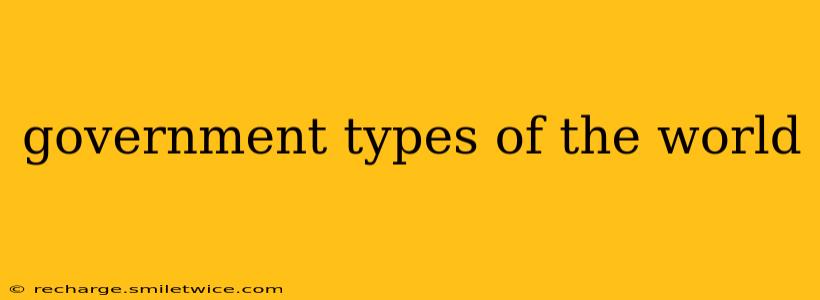The world's governments exhibit a fascinating array of structures and ideologies. Understanding these diverse systems is crucial for comprehending global politics, economics, and social dynamics. This guide explores the major types of government, examining their characteristics, strengths, and weaknesses. We'll delve into the nuances of each system and address common questions surrounding their implementation and effectiveness.
What are the different types of government?
This is a broad question with many answers, as governments often blend characteristics of different systems. However, several core types provide a useful framework for understanding global governance:
-
Democracy: In a democracy, supreme power is vested in the people and exercised by them directly or indirectly through a system of representation, typically involving periodic free and fair elections. This can manifest as a direct democracy (citizens directly vote on policies) or a representative democracy (citizens elect representatives to make decisions on their behalf). Sub-types include parliamentary democracies (where the executive branch is drawn from the legislature) and presidential democracies (where the executive and legislative branches are separately elected).
-
Autocracy: An autocracy is characterized by rule by a single person or a small group with absolute power, often without the consent of the governed. Power is usually concentrated in the hands of a dictator, monarch, or a ruling elite. Examples include absolute monarchies and totalitarian regimes.
-
Oligarchy: Similar to an autocracy, an oligarchy involves rule by a small group of people, usually from a particular social class, ethnic group, or political party. These groups often maintain power through wealth, military strength, or social influence.
-
Theocracy: In a theocracy, religious leaders hold significant power, often wielding influence over the government's policies and laws based on religious doctrines. The degree of religious influence can vary greatly.
-
Anarchy: Anarchy, in its purest form, is the absence of any governing authority. While rarely seen as a fully realized system at the state level, anarchist principles often influence social movements advocating for decentralized governance and individual liberty.
What are the characteristics of a good government?
A "good" government is subjective and depends on societal values, but several key characteristics are often cited:
- Accountability: Government officials are responsible for their actions and can be held accountable to the people they serve.
- Transparency: Government processes and decisions are open to public scrutiny.
- Effectiveness: The government effectively addresses the needs and concerns of its citizens.
- Efficiency: The government operates effectively and uses resources wisely.
- Fairness: Laws and policies are applied fairly and impartially.
- Rule of Law: Everyone is subject to and equal under the law.
What is the most common type of government in the world?
While a precise count is difficult due to the complexities of classifying governmental systems, democracies in various forms are arguably the most prevalent. However, the quality of these democracies varies greatly, with many exhibiting limitations in terms of citizen participation, accountability, and freedom of expression.
What are the advantages and disadvantages of different government types?
The advantages and disadvantages of each government type are complex and context-dependent. For example, democracies can promote citizen participation and prevent tyranny but can be slow and inefficient. Autocracies can be decisive and efficient but often suppress dissent and human rights. Oligarchies can prioritize the interests of the ruling elite over the broader population. Theocracies can provide social cohesion but may conflict with individual liberties and secular values. Anarchy, in theory, offers maximum individual freedom, but in practice often leads to chaos and instability. A thorough evaluation requires careful consideration of specific historical and cultural contexts.
How do different government types affect the economy?
Government type significantly influences economic policies and performance. Democracies often prioritize market-based economies, although the degree of government regulation varies. Autocracies may favor centralized economic planning, often leading to inefficiencies and reduced innovation. The economic impact also depends on factors such as resource management, corruption levels, and the level of political stability.
This overview provides a starting point for understanding the diverse types of government found across the globe. Further research into specific countries and their governmental systems will reveal the rich tapestry of political organization that shapes our world.
